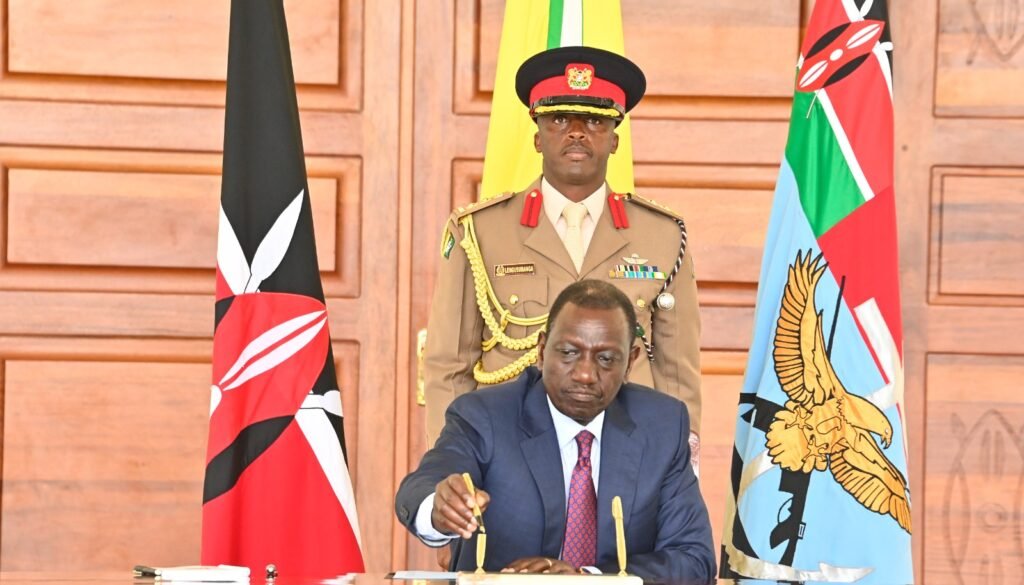President William Ruto has said the Executive is committed to supporting the Judiciary so that it can serve Kenyans better.
Speaking at the swearing-in ceremony for 20 new High Court judges at State House, Nairobi, the President said an effective and efficient Judiciary was good for Kenya because the country’s economy and security, as well as the citizens’ rights and freedoms depend on the Judiciary.
“We shall make our contribution to enhance the capacity of the Judiciary to deliver justice in every part of Kenya,” said President Ruto.In the Budget expected to be presented to Parliament in June, 2024, the Judiciary has been allocated Sh23.7 billion, up from Sh22.8 billion in the current financial year.
The Judiciary’s budget is used, in part, to build new courts, hire new staff and improving the capacity of law enforcement agencies.
President Ruto expressed confidence that the three arms of government – the Executive, Legislature and Judiciary – will continue engaging in a progressive manner and finding consensus in ways that serve the citizens better.
“An independent Judiciary, an effective Executive, a progressive Legislature, an open civil society and a vigilant media are not mutually exclusive; instead, they share the mandate to serve the people and should complement one another’s efforts,” he said.
He challenged judges to reject any form of corruption and serve Kenyans with integrity and professionalism.
“Ultimately, we will be judged not by how we serve the strong and influential, but by how we support the weak, the poor, and the vulnerable,” he said.
Corruption has remained a thorn in the flesh of the Judiciary, amid allegations that magistrates and judges receive bribes to influence the outcome of cases. Among the more recent judges to be dismissed over impropriety was Juma Chitembwe, who was accused of accepting a piece of land to influence the outcome of a succession case.
- President Ruto appoints 20 High Court judges
- 20 High Court judges sworn in as Ruto pledges judiciary support
- Former LSK president join roll of Senior Counsel
In March, 2024, the Judicial Service Commission recommended the suspension of the Environment and Land Court judge, Justice Mohammed Kullow, over alleged gross misconduct, incompetence and violation of the Judicial Service Code of Conduct.
“Corruption, even the slightest hint of it, irreversibly compromises the authority and effectiveness of our courts,” said the President on Tuesday.
He challenged judges to live up to the expectations of Article 10 of the Constitution, which contains provisions on national values and principles of governance.
The Article states:
(1) The national values and principles of governance in this Article bind all State organs, State officers, public officers and all persons whenever any of them:-
a) applies or interprets this Constitution;
b) enacts, applies or interprets any law; or
c) makes or implements public policy decisions.
(2) The national values and principles of governance include:-
a) patriotism, national unity, sharing and devolution of power, the rule of law, democracy and participation of the people;
b) human dignity, equity, social justice, inclusiveness, equality,
c) human rights, non-discrimination and protection of the marginalised;
d) good governance, integrity, transparency and accountability; and
e) sustainable development
He also challenged them to live up to the provisions of Article 159, from which the Judiciary derives its mandate.
The Article states in part:
In exercising judicial authority, the courts and tribunals shall be guided by the following principles—
(a) justice shall be done to all, irrespective of status;
(b) justice shall not be delayed;
(c) alternative forms of dispute resolution including reconciliation, mediation, arbitration and traditional dispute resolution mechanisms shall be promoted, subject to clause (3);
(d) justice shall be administered without undue regard to procedural technicalities; and
(e) the purpose and principles of this Constitution shall be protected and promoted.
Said the President: “Your devotion to these mandates and undertakings, and your commitment to diligently serve the people of Kenya, and do justice to them – without fear, favour, bias, affection, ill-will, prejudice or any political, religious or other influence – will make the difference between progress and failure, freedom and tyranny, and prosperity and destitution for the people of our beloved nation”.



